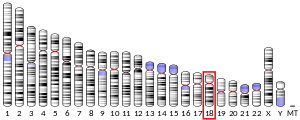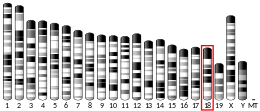DTNA
Dystrobrevin alpha
Protein found in humans
Dystrobrevin alpha is a protein that in humans is encoded by the DTNA gene.[5][6][7]
The protein encoded by this gene belongs to the dystrobrevin subfamily and the dystrophin family. This protein is a component of the dystrophin-associated protein complex (DPC). The DPC consists of dystrophin and several integral and peripheral membrane proteins, including dystroglycans, sarcoglycans, syntrophins and alpha- and beta-dystrobrevin. The DPC localizes to the sarcolemma and its disruption is associated with various forms of muscular dystrophy. This protein may be involved in the formation and stability of synapses as well as the clustering of nicotinic acetylcholine receptors. Multiple alternatively spliced transcript variants encoding different isoforms have been identified.[7]
Mutations in DTNA are associated with Ménière's disease.[8][9]
Dystrobrevin has been shown to interact with dystrophin.[10]
- "Human PubMed Reference:". National Center for Biotechnology Information, U.S. National Library of Medicine.
- "Mouse PubMed Reference:". National Center for Biotechnology Information, U.S. National Library of Medicine.
- Khurana TS, Engle EC, Bennett RR, Silverman GA, Selig S, Bruns GA, Kunkel LM (Oct 1994). "(CA) repeat polymorphism in the chromosome 18 encoded dystrophin-like protein". Hum Mol Genet. 3 (5): 841. doi:10.1093/hmg/3.5.841-a. PMID 8081380.
- Lopez-Escamez JA, Carey J, Chung WH, Goebel JA, Magnusson M, Mandalà M, Newman-Toker DE, Strupp M, Suzuki M, Trabalzini F, Bisdorff A (2015). "Diagnostic criteria for Menière's disease". J Vestib Res. 25 (1): 1–7. doi:10.3233/VES-150549. PMID 25882471.
- Requena T, Cabrera S, Martín-Sierra C, Price SD, Lysakowski A, Lopez-Escamez JA (2014). "Identification of two novel mutations in FAM136A and DTNA genes in autosomal dominant familial Meniere's disease". Human Molecular Genetics. 24 (4): 1119–26. doi:10.1093/hmg/ddu524. PMC 4834881. PMID 25305078.
- Sadoulet-Puccio HM, Rajala M, Kunkel LM (Nov 1997). "Dystrobrevin and dystrophin: An interaction through coiled-coil motifs". Proc. Natl. Acad. Sci. U.S.A. 94 (23): 12413–8. Bibcode:1997PNAS...9412413S. doi:10.1073/pnas.94.23.12413. PMC 24974. PMID 9356463.
- Straub V, Campbell KP (1997). "Muscular dystrophies and the dystrophin-glycoprotein complex". Current Opinion in Neurology. 10 (2): 168–75. doi:10.1097/00019052-199704000-00016. PMID 9146999.
- Ozawa E, Noguchi S, Mizuno Y, Hagiwara Y, Yoshida M (1998). "From dystrophinopathy to sarcoglycanopathy: evolution of a concept of muscular dystrophy". Muscle Nerve. 21 (4): 421–38. doi:10.1002/(SICI)1097-4598(199804)21:4<421::AID-MUS1>3.0.CO;2-B. PMID 9533777. S2CID 25273816.
- Blake DJ (2002). "Dystrobrevin dynamics in muscle-cell signalling: a possible target for therapeutic intervention in Duchenne muscular dystrophy?". Neuromuscul. Disord. 12 (Suppl 1): S110–7. doi:10.1016/S0960-8966(02)00091-3. PMID 12206805. S2CID 9188156.
- Ahn AH, Kunkel LM (1995). "Syntrophin binds to an alternatively spliced exon of dystrophin". J. Cell Biol. 128 (3): 363–71. doi:10.1083/jcb.128.3.363. PMC 2120343. PMID 7844150.
- Ahn AH, Freener CA, Gussoni E, Yoshida M, Ozawa E, Kunkel LM (1996). "The three human syntrophin genes are expressed in diverse tissues, have distinct chromosomal locations, and each bind to dystrophin and its relatives". J. Biol. Chem. 271 (5): 2724–30. doi:10.1074/jbc.271.5.2724. PMID 8576247.
- Blake DJ, Nawrotzki R, Peters MF, Froehner SC, Davies KE (1996). "Isoform diversity of dystrobrevin, the murine 87-kDa postsynaptic protein". J. Biol. Chem. 271 (13): 7802–10. doi:10.1074/jbc.271.13.7802. PMID 8631824.
- Sadoulet-Puccio HM, Khurana TS, Cohen JB, Kunkel LM (1996). "Cloning and characterization of the human homologue of a dystrophin related phosphoprotein found at the Torpedo electric organ post-synaptic membrane". Hum. Mol. Genet. 5 (4): 489–96. doi:10.1093/hmg/5.4.489. PMID 8845841.
- Ambrose HJ, Blake DJ, Nawrotzki RA, Davies KE (1997). "Genomic organization of the mouse dystrobrevin gene: comparative analysis with the dystrophin gene". Genomics. 39 (3): 359–69. doi:10.1006/geno.1996.4515. PMID 9119373.
- Metzinger L, Blake DJ, Squier MV, Anderson LV, Deconinck AE, Nawrotzki R, Hilton-Jones D, Davies KE (1997). "Dystrobrevin deficiency at the sarcolemma of patients with muscular dystrophy". Hum. Mol. Genet. 6 (7): 1185–91. CiteSeerX 10.1.1.497.387. doi:10.1093/hmg/6.7.1185. PMID 9215691.
- Sadoulet-Puccio HM, Rajala M, Kunkel LM (1997). "Dystrobrevin and dystrophin: An interaction through coiled-coil motifs". Proc. Natl. Acad. Sci. U.S.A. 94 (23): 12413–8. Bibcode:1997PNAS...9412413S. doi:10.1073/pnas.94.23.12413. PMC 24974. PMID 9356463.
- Blake DJ, Nawrotzki R, Loh NY, Górecki DC, Davies KE (1998). "β-dystrobrevin, a member of the dystrophin-related protein family". Proc. Natl. Acad. Sci. U.S.A. 95 (1): 241–6. Bibcode:1998PNAS...95..241B. doi:10.1073/pnas.95.1.241. PMC 18188. PMID 9419360.
- Nawrotzki R, Loh NY, Ruegg MA, Davies KE, Blake DJ (1999). "Characterisation of alpha-dystrobrevin in muscle" (PDF). J. Cell Sci. 111 (17): 2595–605. doi:10.1242/jcs.111.17.2595. PMID 9701558.
- Blake DJ, Hawkes R, Benson MA, Beesley PW (1999). "Different Dystrophin-like Complexes Are Expressed in Neurons and Glia". J. Cell Biol. 147 (3): 645–58. doi:10.1083/jcb.147.3.645. PMC 2151186. PMID 10545507.
- Sadoulet-Puccio HM, Feener CA, Schaid DJ, Thibodeau SN, Michels VV, Kunkel LM (2000). "The genomic organization of human dystrobrevin". Neurogenetics. 1 (1): 37–42. doi:10.1007/s100480050006. PMID 10735273. S2CID 22588879.
- Piluso G, Mirabella M, Ricci E, Belsito A, Abbondanza C, Servidei S, Puca AA, Tonali P, Puca GA, Nigro V (2000). "Gamma1- and gamma2-syntrophins, two novel dystrophin-binding proteins localized in neuronal cells". J. Biol. Chem. 275 (21): 15851–60. doi:10.1074/jbc.M000439200. PMID 10747910.
- Yoshida M, Hama H, Ishikawa-Sakurai M, Imamura M, Mizuno Y, Araishi K, Wakabayashi-Takai E, Noguchi S, Sasaoka T, Ozawa E (2000). "Biochemical evidence for association of dystrobrevin with the sarcoglycan-sarcospan complex as a basis for understanding sarcoglycanopathy". Hum. Mol. Genet. 9 (7): 1033–40. doi:10.1093/hmg/9.7.1033. PMID 10767327.
- Tommasi di Vignano A, Di Zenzo G, Sudol M, Cesareni G, Dente L (2000). "Contribution of the different modules in the utrophin carboxy-terminal region to the formation and regulation of the DAP complex". FEBS Lett. 471 (2–3): 229–34. doi:10.1016/S0014-5793(00)01400-9. PMID 10767429. S2CID 21529759.
This article on a gene on human chromosome 18 is a stub. You can help Wikipedia by expanding it. |






